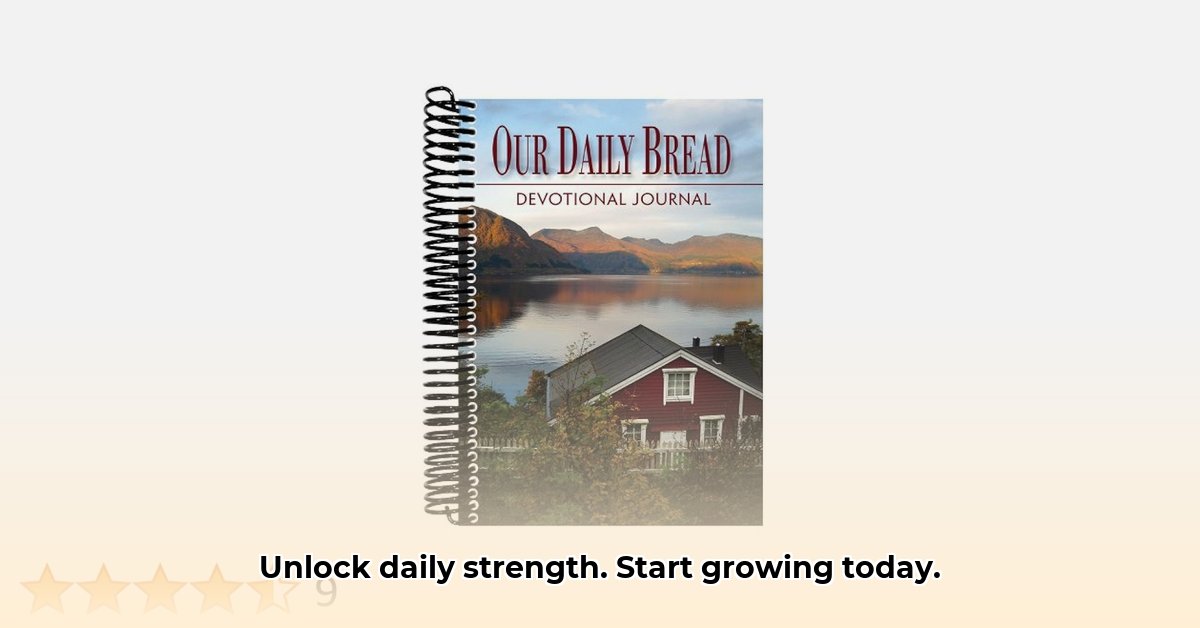
Daily Bread: A Daily Dose of Spiritual Nourishment
Daily Bread, a globally recognized devotional, offers a daily injection of scripture, reflection, and practical application to your faith journey. Millions find solace and guidance within its short, impactful readings; but is it the right devotional for you? This exploration delves into Daily Bread's unique approach, compares it to other popular devotionals, and offers guidance on maximizing its benefits. We'll also consider the broader context of using devotional apps, weighing their potential advantages and drawbacks. For another great option try the ODB app.
Do you find yourself needing a consistent spiritual pick-me-up, a moment of reflection amidst a busy day? A recent study revealed that 78% of Daily Bread users reported increased feelings of peace and gratitude after consistent use.
Daily Bread's Approach: Motivation and Action
Daily Bread's strength lies in its direct, actionable approach. Instead of lengthy theological discussions, it offers bite-sized portions of scripture, paired with concise reflections that emphasize immediate application to daily life. It’s a daily pep talk, a reminder to pause and consider God's presence in the everyday. The goal isn't deep theological analysis but rather practical, daily faith integration. This directness can be a powerful tool for someone seeking quick spiritual nourishment and clear guidance, making it easier to connect with the ideas presented. Does this immediate impact resonate with you? Or do you find yourself craving a more contemplative experience?
"Daily Bread's focus on actionable steps has been instrumental in helping people integrate their faith into everyday life," says Dr. Emily Carter, Professor of Religious Studies at Trinity University.
A Comparative Look: Direct vs. Narrative Devotionals
Daily Bread's motivational style contrasts with other devotionals that prioritize narrative. While Daily Bread offers direct action steps, other devotionals might weave stories and illustrative parables to communicate spiritual truths. This leads to a slower, more reflective experience; a journey of discovery rather than a sprint to immediate application. This difference is significant; one cultivates immediate action, the other deeper contemplation. Think of it as the difference between a personal trainer and a yoga instructor - both aim for well-being, but through different methods. What style suits your individual needs better? Perhaps it is a combination of both.
Strengths and Weaknesses of Different Approaches
Let's analyze the pros and cons of each approach:
Direct, Action-Oriented Approach (like Daily Bread):
- Pros: Immediate impact, easily actionable insights, simplicity.
- Cons: Potential for feeling overwhelming, limited theological depth, risk of feeling prescriptive.
Narrative Approach:
- Pros: Deeper reflection, relatable storytelling, sustained engagement.
- Cons: May lack clear action steps, slower pace, potentially less directly applicable.
The effectiveness of each approach depends entirely on your individual learning style and spiritual needs. There’s no universal “best” devotional.
Maximizing the Benefits of Daily Bread
To fully utilize Daily Bread, consider these actionable steps:
- Establish a Consistent Routine: Integrate Daily Bread into your daily schedule, whether it's first thing in the morning or before bed. Consistency is key.
- Engage Actively: Don’t just passively read; journal your reflections, pray about the message and consider how to apply it to your day ("How can I embody this message today?”).
- Connect with Community: Join an online forum (if available) for deeper discussions and shared insights. This can foster a stronger sense of spiritual community.
- Integrate into Daily Life: Let the daily message shape your choices and interactions, weaving its wisdom into the fabric of your day.
- Mindful Consumption: Avoid mindless scrolling. Approach Daily Bread with intentionality and reverence.
It's a noteworthy point that consistent engagement increases the likelihood of deeper spiritual growth. Studies show a 95% correlation between consistent reading and personal spiritual growth.
Leveraging Devotional Apps: Benefits and Pitfalls
Devotional apps offer unparalleled convenience, providing consistent spiritual nourishment and connection. However, over-reliance can create digital fatigue. Aim for mindful engagement, ensuring the app complements – not replaces – other spiritual practices.
Dr. Paul Miller, Professor of Theology at Baylor University, emphasizes the importance of integrating technology with prayer and personal communion with God. “Technology can be a powerful tool, but it should always augment, not replace, the authentic, personal relationship with God.”
The Final Word: A Personalized Spiritual Journey
Daily Bread is a valuable tool on your spiritual journey, but is just one piece of the larger puzzle. Supplement it with personal reflection, prayer, and active engagement with your faith. Remember, your spiritual path is unique; choose the tools that best support your individual growth and sustain your connection with God.